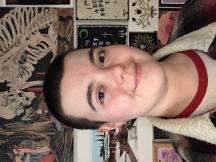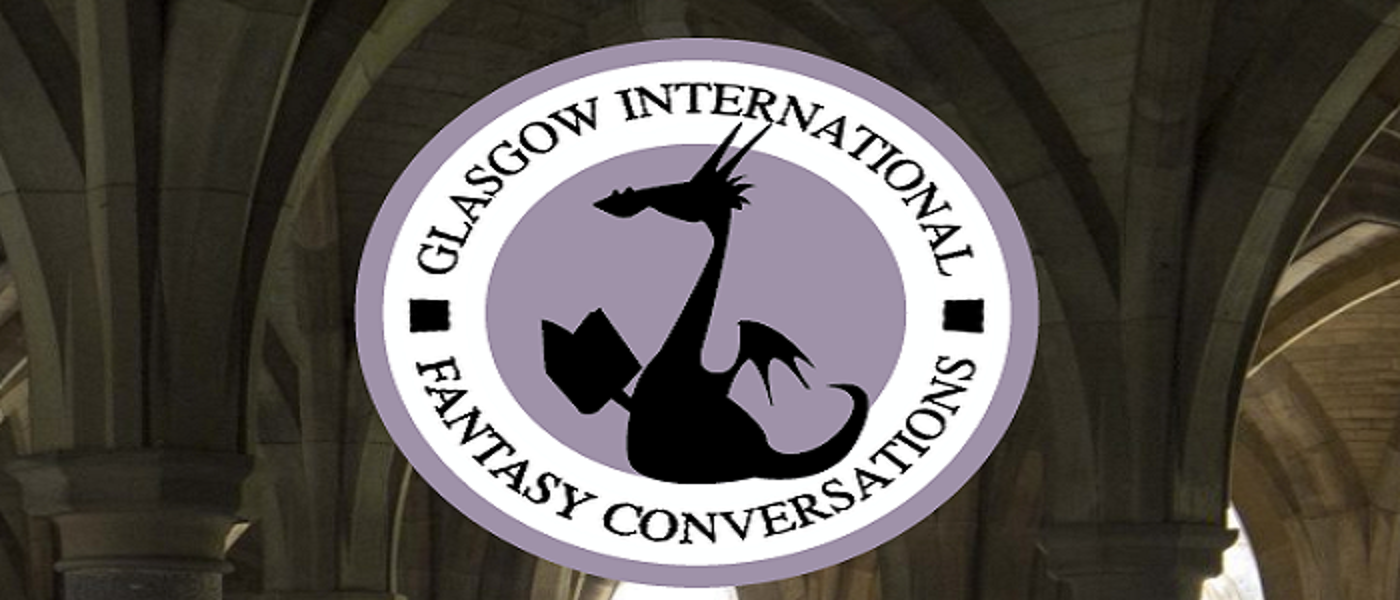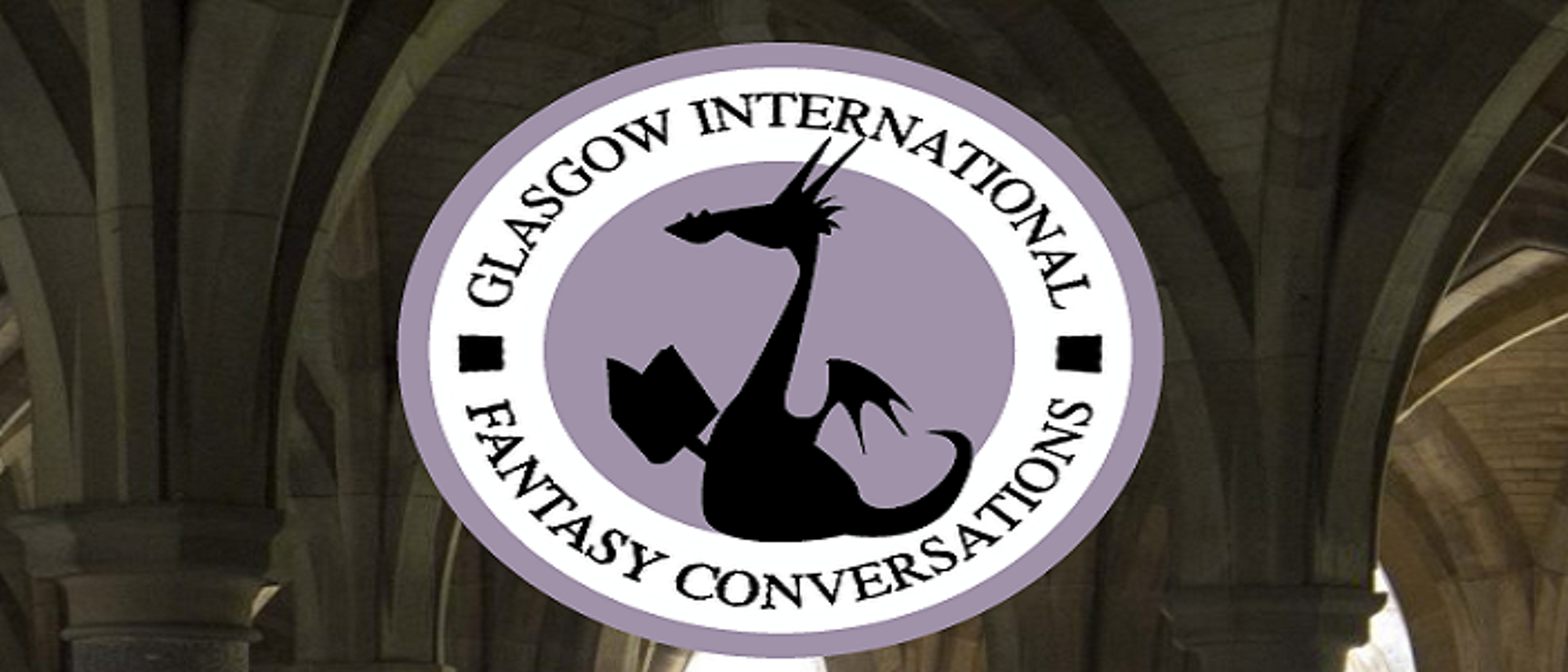
GIFCon
GIFCon 2025
Glasgow International Fantasy Conversations
Queering the Fantastic
7th–9th May 2025, Online
Registration coming soon!
Follow us on Twitter, Facebook, and Instagram.
Access the GIFCon 2025 Discord here
Contact us at: GIFCon@glasgow.ac.uk
Keynote Speakers
GIFCon 2025 is excitedly working on our Keynotes for 2025. Watch this space and our blog for their announcement early 2025!
Call For Papers
GIFcon 2025: Queering the Fantastic
The deadline for all three forms is January 6th, 2025, at midnight GMT.
The Centre for Fantasy and the Fantastic is pleased to announce a call for papers for Glasgow International Fantasy Conversations (GIFCon) 2025, to be held online on 7-9 May, with the theme of ‘Queering the Fantastic’.
Call for Papers
The term ‘queer’ has been conceived as “the point of convergence for a potentially infinite number of non-normative subject positions”(Jagose qtd. in Hollinger), echoing Fantasy’s scope for alternative realities which challenge sociocultural norms. Its etymology points out to strange and unusual qualities, to the eccentric and the odd, which have always been at the heart of SFF, arguably making the genre inherently queer. Yet, fantastika—its academia and industry, creative practitioners and fans alike—has failed to be a safe space for queer identities, as indicated by its cisheteronormative tradition and the Hugo Awards’ Sad Puppies controversy, among others.
Is that still the case?
In recent years, practitioners and audiences alike have reclaimed fantastic media, framing it through the lens of queer experience. Either through bringing queer characters and stories to the forefront, or by effecting reimaginings of traditional fantastic narratives, such as Jeanette Winterson’s Frankissstein or Aliette de Board’s In the Vanisher’s Palace, the place of the LGBTQ+ community within the field of the fantastic has been increasingly celebrated.
The process of queering fantasy is not limited to the author: the reader actively participates in the process of re-creation. Headcanons and shipping, bringing queer subtexts to the surface through fanfiction and alternative universes, and formats that endorse collaborative storytelling within a fandom, all encompass a process of queer reading, embracing chaos, instability and multiplicity in an ongoing process of community self-expression.
In this conference, we would like to engage with the following questions: How are fantastic narratives reclaimed by people in the margins? What are the implications of such reimaginings? How do we envision a queer future of SFF in terms of multi-media creations and scholarly work? And what challenges will the field/genre face to reach this future?
About GIFCon and proposing your paper
GIFCon 2025 is a three-day virtual conference welcoming proposals from researchers and practitioners working in the field of fantasy and the fantastic across all media, whether from within academia or beyond it. We are particularly interested in submissions from postgraduate and early career researchers, and researchers whose work focuses on fantasy from the margins.
We welcome abstracts for 20-minute papers. See our Suggested Topics list below for further inspiration and our advice for abstract submissions. Please submit a 300-word abstract and a 100-word bionote via this form.
We also ask for workshop proposals for 75-minute creative workshops. Please submit a 100-word description and a 100-word bionote via this form.
Similarly, you may also offer 60-minute roundtable proposals. Please submit a 100-word description and a 100-word bionote via this form.
The deadline for all three forms has been extended to January 17th, 2025, at midnight GMT.
If you have any questions regarding our event or our CfP, you can contact us at GIFCon@glasgow.ac.uk. Please also read through our Code of Conduct.
We look forward to reading your submissions!
Suggested Topics
Suggested Topics include, but are not limited to, the following:
- Conforming to and challenging conventional depictions of gender and sexuality in fantasy media.
- “We could do with a bit more queerness in these parts”: Fantasy and the multiple expressions of the term ‘queer’, in its rich etymological history—strange, unusual, odd and eccentric.
- The role of queer identity in authorship: as an act of activism, fighting for representation, resistance to heteronormativity and its consequences, or authors retconning queer identities (e.g. JK Rowling).
- The role of queer identity in the reading process: Fandom studies, fanfiction, queer rewritings of the canon, affective responses to queer fantasies by the LGBTQ+ community, ‘straight-washing’ potential queer identities by fans.
- Fantasy and the Qu(eerie): weird fiction, the new weird and the eerie.
- Queering narratives through collaborative storytelling: RPGs, TTRPGs, hypertext fiction.
- Queer narratives and their place in the fantasy publishing and/or media industry (rainbow capitalism): queerbaiting, suppression of queer voices, as well as inclusive initiatives within the industry.
- Fantasy worldbuilding to explore the social construction of gender norms and sexualities beyond heteronormativity.
- Performing queerness in fantastika: exploring different gender expressions in the performance arts, theatre, drag, pantomime and the importance of camp.
- Fantasy and queer history: how queer creative practitioners in the past have used fantasy as means of queer expression through different figures (e.g. the fairy to explore androgynous identities).
- Fantastical monsters as queer Others/Icons, Horror and Gothic Studies.
- Queer readings of liminal fantastical creatures: cyborgs, hybrids, human/non-human entanglements, specifically to explore trans and/or non-binary experiences.
- Queer celebration as resistance: fantastic narratives of hope, vulnerabilities, queer futurities, utopias, hopepunk.
- Processes of self-discovery and transformation: queer coming-of-age, YA fantasies.
- Intersectional approaches to queer fantastika: race, (dis)abilities, class, age, other marginalised identities.
- Queer embodiment and corporeality: body-swapping, body dysphoria narratives, particularly trans readings of fantasy characters.
- Fantasy texts and media by creative practitioners from marginalised backgrounds, and from beyond the anglophone and Anglocentric fantasy media and queer epistemologies.
- How scholars recreate, reinterpret, and validate queer approaches to fantasy in academia.
Submission Guidelines
Submission Guidelines
- For paper submissions, please submit a 300-word (maximum) abstract including title and references, if any
- For creative workshop submissions, please submit a 100-word (maximum) abstract
- Similarly, for roundtable proposals, please submit a 100-word (maximum) abstract and all names of participants
- All proposals will asked you to submit 100-word (maximum) biographical note written in 3rd person and indicating your preferred pronouns.
- If you would like to remain anonymous during the event, please let the GIFCon Committee know via email
- Please use UK spelling and grammar conventions
- Please take time to read GIFCon’s Code of Conduct to ensure your submission complies with our symposium’s CoC
Follow the link to our Paper Submission form here.
Follow the link to our Creative Workshop Submissions form here.
Follow the link to our Roundtable Submissions form here.
Deadline for submissions: 6th January 2025, midnight (GMT)
Advice for First Time Submissions
The GIFCon committee especially welcomes proposals from postgraduate students and early career researchers. We have provided some advice below for those submitting their first paper or workshop proposal. Please note that this guide is intended for our event and should not be considered as universal advice, as each conference/symposium establishes its own rules and guidelines.
There are three key things to consider for paper submissions:
- Paper’s Fit to the Theme
- A Clear, Concise Argument
- Paper’s Fit to the Timeslot
1) Paper’s Fit to the Theme
How does your paper fit in with the conference theme? Clearly and concisely explain in one or two sentences how your paper suits GIFCon’s theme. You can also pop a key word from the CfP in your title, if that is suitable for your abstract.
2) A Clear, Concise Argument
Outline in your abstract your paper’s argument. You can include where it sits in the field, why you are exploring this aspect of your topic, which texts you are looking at, and what you hope to illuminate by doing so. Your argument will help the committee to grasp what you are intending to do in your paper and how to best place it in our programme, especially if your paper covers a niche within your subject. If the abstract requires technical terms specific to your area or subject, please clearly define them.
3) Paper’s Fit to the Timeslot
We are looking for papers that can be presented within a 20-minute timeslot. One rule of thumb is to imagine 20 minutes as roughly 2000 spoken words. You can also practice reading your paper out loud to ensure it fits within the given time before the event.
Workshop proposals:
Workshop abstract proposals are 100-word (maximum) and also include a 100-word (maximum) bionote. If you are submitting a proposal for a workshop, please include the workshop’s title, the number of participants allowed, an outline covering what you will accomplish in the workshop, and what materials you would need (a zoom meeting setup, a shared document etc.).
Just as with paper proposals, the abstract should make it clear how your workshop fits to theme and demonstrates that the workshop aims are feasible to accomplish within the 75-minute timeslot.
Before submitting, please:
- Make sure your abstract does not exceed the specified word count. This word count includes title and references.
- Take the time to proofread your abstract for any grammar and spelling errors. At GIFCon we use UK conventions.
- Ensure that you have a 100-word maximum biographical note written in the 3rd person and indicating your preferred pronouns (see example). However, if you would like to remain anonymous throughout the event, please email us before the deadline for guidance on submitting anonymously.
We would also like to ask you to review our Code of Conduct prior to your submission in order to make sure your paper complies with our symposium’s CoC.
Finally, if you have any questions about submitting your abstract to an event, please get in touch with us via email at GIFCon@glasgow.ac.uk. We look forward to your submission!
Example of a 100-word max bionote:
Kisar Euric (he/they) is a 3rd year PhD candidate at Lepeig University on the planet Mars where they research pre-habitation Science-Fiction in the early 21st century and its effect on contemporary artwork. Kisar completed their Masters degree at the University of Glasgow, where they were a part of the 2085 Fantasy MLitt class. Additionally, Kisar runs the Forgotten Fans Group and has worked as the Administration Officer for the Cross-Fantastika Conference for two years. Kisar lives with their partners Nayla and Deri and their cat Greebo. Their holographic games fan fiction can be found online (if you look hard enough).
GIFCon Code of Conduct
GIFCon Code of Conduct
GIFCon aims to be an inclusive and diverse space for scholars, students, creatives, fans, and the general public.
As one of the flasghip annual activities of the Centre for Fantasy and the Fantastic, GIFCon is covered by the CFF Code of Conduct. Please take the time to read it carefully.
In addition, please note the GIFCon Netiquette below:
- The GIFCon Netiquette complies with the guidelines set out by the Centre for Fantasy and the Fantastic’s Code of Conduct.
- GIFCon acknowledges concerns regarding the circulation of recorded talks or written papers online. Speakers and Attendees will be asked for their permission to be recorded during any of GIFCon's online activities or events prior to such recording taking place.
- Speakers may choose to upload their paper or presentation to the platform of their choice and provide a URL link to be made available to Attendees. Alternatively, they can provide the GIFCon Organisers with a version of the presentation in advance for accessibility purposes.
- We are aware that platforms such as Zoom are not available globally and we are working on different alternatives to accommodate Attendees to all our events and activities. If you have any concerns in this regard, please contact GIFCon
Policy for Participation in Online Sessions (Panels, Keynotes, and/or Workshops)
- The default setting for Attendees should be to have microphones muted. This is to avoid background noises that may disrupt the sessions.
- For conferences and panels, Speakers will unmute to engage in presentation and/or discussion.
- Workshop organisers will instruct Attendees regarding the specific dynamics of their events.
- When the event platform and settings allow, Attendees can choose whether they wish to engage or not with the video component of the event. Both video options (on or off) are valid.
- If the Attendees’ video and audio has been muted, they can communicate and pose their questions via the chat function or the Q&A section. Otherwise, questions for sessions, panels, keynotes, or workshops will begin only once the moderator and/or organizers invite questions. Do not interrupt either speakers or moderators to pose questions.
- Screen sharing will be enabled only for Committee Members, scheduled Speakers, and/or Moderators. Once Speakers have finished with the presentation, they should end the sharing of their screen.
- Attendees are welcome to post comments on the chat function of the platforms used by GIFCon during sessions, panels, keynotes, or workshops, as long as they abide by our COC.
- Q&A sessions and discussions must comply with our COC.
- During GIFCon, all backgrounds in Zoom, Discord, YouTube, and so on must adhere to our COC.
- Presenters will be able to request that Attendees refrain from live tweeting about their specific presentation for any reason. Attendees are expected to honour this request.
- Depending on the severity of the incident, violations to our Netiquette will be regarded as outlined by our Anti-Harassment and Anti-Bullying Policy. This can result in warning those concerned and asking them to modify their behaviour; restricting contact with Centre Members and Attendees, including banning those concerned from specific online sessions or the symposium altogether; and contacting University of Glasgow Authorities.
Equality, Diversity, and Accessibility Policy
Everybody can help
We believe everybody at GIFCon can contribute to making this event a safe and welcoming environment. Whether you are an Organiser, a Volunteer, Speaker, or an Attendee, please consider the following:
Conferences, Panels, and Workshops
If you are a Speaker at GIFCon, you will be given guidelines that include suggestions such as:
- If you are prerecording your presentation or would like your Chair to have a backup copy of your presentation materials, please send presentation materials to GIFCon@glasgow.ac.uk.
- If you are reading your presentation and are comfortable with showing your face during our online sessions, it is really helpful to keep your mouth visible when speaking for those who lip-read.
- Speakers also have the possibility of sharing their written paper with GIFCon attendees as a means to make their presentation more accessible for those with visual or hearing impairments. If this is something you would like to do, please contact our Committee.
For presentations with PowerPoint slides, please consider the following:
- If your slides include text, you can try to use it sparingly and in bold, large, and clear fonts in colours that have a high contrast with the background colour of your slides. Reading the text of your slides out loud during your presentation is helpful.
- Avoid red or green to either highlight or emphasise anything on your slides, as these colours can be difficult for those with visual impairments.
- The templates provided by PowerPoint, as they are pre-approved for screen readers and other accessibility devices.
- If your slides include images, please incorporate alt text (a brief one or two sentence description to accompany the image) or verbally describe the image during the presentation. This can be extremely helpful for Attendees with visual impairments and neurodiverse Attendees.
- If online events or activities take place on Zoom, the Deputy Chair will enable Zoom subtitles at the beginning of the event. You can personalize how subtitles appear on your screen by clicking the “Live Transcript” button on your Zoom menu.
- You can also help create subtitles in your PowerPoint slides to help people follow along. Instructions on how to do this can be found on the Microsoft Support website: Present with real-time, automatic captions or subtitles in PowerPoint.
- More information on how to create accessible PowerPoint slides can be found at the Microsoft Office Support website.
- If your presentation includes documents created with a Microsoft Office programme, we encourage you to use the Accessibility Checker.
- For more information, feel free to visit this site on dyslexia and this one on visual impairments.
- If your presentation, paper, or workshop covers sensitive materials or subjects, the GIFCon Committee asks that you give a trigger warning at the start of your talk.
- Please let the Committee know if you plan to use any flashing images or strobes so that Attendees can be advised in advance.
How to attend GIFCon 2025
GIFCon 2025 Counjuring Creatures and Worlds will take place online.
Registeration for GIFCon 2025: Queering the Fantastic will be coming shortly!
GIFCon 2025 Committee
Chair: Will Tattersdill
Deputy Chair: Grace A.T. Worm
Accessibility and Diversity officer: Joseph Paolantonacci
Communications officer: Hollie Willis
Events officer/Programming: Alice Langley
MLitt Liason: Lorna Ross
Programming: Ane B. Ruiz-Lejarcegui
Social Media officer: Lea Warren
GIFCon Committee Bios

Alice Langley is a recently vivaed researcher working between the Creative Writing and English Literature Departments at the University of Glasgow. Her thesis centres on female petrification and she has written a novel in which women give birth to stones as a physical manifestation of grief from miscarriage. She has presented her work on various topics, including the work of Holly Black and the game Werewolf, at conferences and conventions internationally, including GifCon, and is thrilled to now be part of bringing together fantastic conversations for 2025.

Ane B. Ruiz-Lejarcegui (she/her) is a 3rd year PhD researcher and member of the REWEST research group at the University of the Basque Country (Spain) and, currently, a visiting PGR at the University of Glasgow. Her thesis studies posthuman consciousness and power asymmetries in contemporary American space opera from narratological and critical posthumanist perspectives. She has previously organised conferences on Myth in the Arts and chaired another on Critical Animal Studies. Her research interests include SFF, posthumanism, transhumanism, cognitive narratology and H.G. Wells. Do not mention Stargate or she might bore you to death.
Grace Ann Thomas Worm (she/they) is still limping towards the end of her PhD on Female Fantasy in Tamora Pierce's fantasy world of Tortall at the University of Glasgow where she runs the Intersectional Fantastika reading group, is Vice Editor for the student journal Mapping the Impossible, and the Headquarters Officer for the Centre for Fantasy and the Fantastic and moderator of its Discord server. Grace is an English Literature International Bachelorette accredited secondary teacher who has taught across the U.S. This is her third GIFCon. She won't shut up about video games, so take pity and talk to her about them.
Hollie Willis is a 2nd-year PhD student at the University of Glasgow, and is part of the Centre for Hollie Willis is a 3rd-year PhD student at the University of Glasgow. Her thesis focuses on representations of funerary rites in contemporary fantasy literature in the context of the death positivity movement. Her research interests also include the Arctic Gothic, cannibalism, and all things fantastical. She was the Social Media officer for GIFCon 2024.
Joseph Paolantonacci
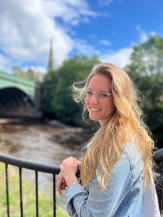
Lea Warren is a first year PhD student at the University of Glasgow focusing on collaborative fantasy fiction, fan studies, and roleplay in Emily Bronte’s ‘Gondal Notebook’ manuscript. Lea has previously worked in two publishing houses, has over six years of marketing experience, and after achieving her MLitt in Fantasy at Glasgow in 2022 stayed on staff with the School of Critical Studies as a postgraduate administrator. When Lea is not working in her administrative role, working on her thesis, or assisting with GIFCon, she can usually be found working on one of her three novels-in-progress, wandering the city with her husband and chaotic Collie-mix, or exploring the countryside in her ambition to become a woodland witch.
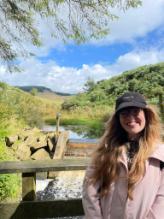
Lorna Ross (she/her)is a first-year part-time student studying on Glasgow University’s Fantasy MLitt programme. She has completed a MA English Literature degree from Edinburgh University where she developed research interests in fairy tales, the gothic, queer theory and medievalism. Her Undergraduate research specialised in understanding representations of femininity and female homosocial relationships through the Bluebeard fairy tale intertext. As a queer woman and lover of queer fantasy, she is very excited to be involved in GifCon 2025.

Will Tattersdill (he/him) is Senior Lecturer in Contemporary Fantasy at Glasgow University and Chair of GIFcon. He writes and teaches about dinosaurs, magazines, science, alternate history, worldbuilding, Star Trek, polar exploration, and choose-your-own adventure books, and is currently editing the short stories of H. G. Wells for Oxford World's Classics.
GIFCon Volunteers
GIFCon could not run without volunteers, who help monitor social media, deal with Zoom headaches so you don't have to, chair panels, and help keep GIFCon running. From everyone on the GIFCon 2025 committee, thank you to all our wonderful volunteers this year.




